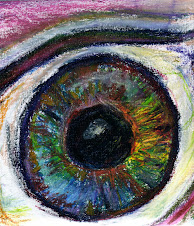"I shut one eye when I read because it is easier," one second grade boy admitted to me at a recent in-office vision therapy session. His diagnosis includes saccadic deficits and convergence insufficiency. He hates to read. No wonder! The words don't stay put on the page when he attempts to read and he can't keep them single unless he closes one eye. However, that strategy deprives him of some detail and appreciation for depth. Within the next 6-12 weeks, though, he should notice a significant difference. The vision therapy activities that we do together and that he does between the weekly sessions at home are research-based and proven to strengthen the eye muscles as well as to help him realize how to coordinate and team both eyes to point to the same location at the same time, thus keeping the image single as well as 3-dimensional.
The next patient, a first grade girl who is in her eighth week of in-office vision therapy, surprised both her mother and me. Her diagnosis is saccadic deficits. This means that she has difficulty moving her eyes quickly and efficiently from one stationary visual target to another- like what the eyes do when moving from a word or a line of text to the next without loss of place, or skipping. I asked her if she has noticed any changes when she reads since she started coming to vision therapy. She said, "Yes, there aren't two words anymore." While this correlates with some of the anecdotal findings I have recorded about her progress, since she did not have a diagnosis related to eye teaming such as convergence insufficiency or convergence excess, we did not realize that she was suffering from dyplopia, double vision. Children have no other visual experience than their own so frequently they do not identify their visual challenges in language that tips off the adults that they need some interventions. This child has more vision therapy work to do to resolve the saccadic deficits but imagine how much more comfortably and successfully her school days must be now that the letters and words on a page look clear, stable, and single.
Vision therapy is an intervention that works to address quite a few learning-related visual issues. If your child is struggling at school, let me encourage you to schedule a comprehensive binocular vision exam with a developmental optometrist who is experienced with pediatric patients and who also incorporates vision therapy into their optometry practice.
Subscribe to:
Post Comments (Atom)





No comments:
Post a Comment